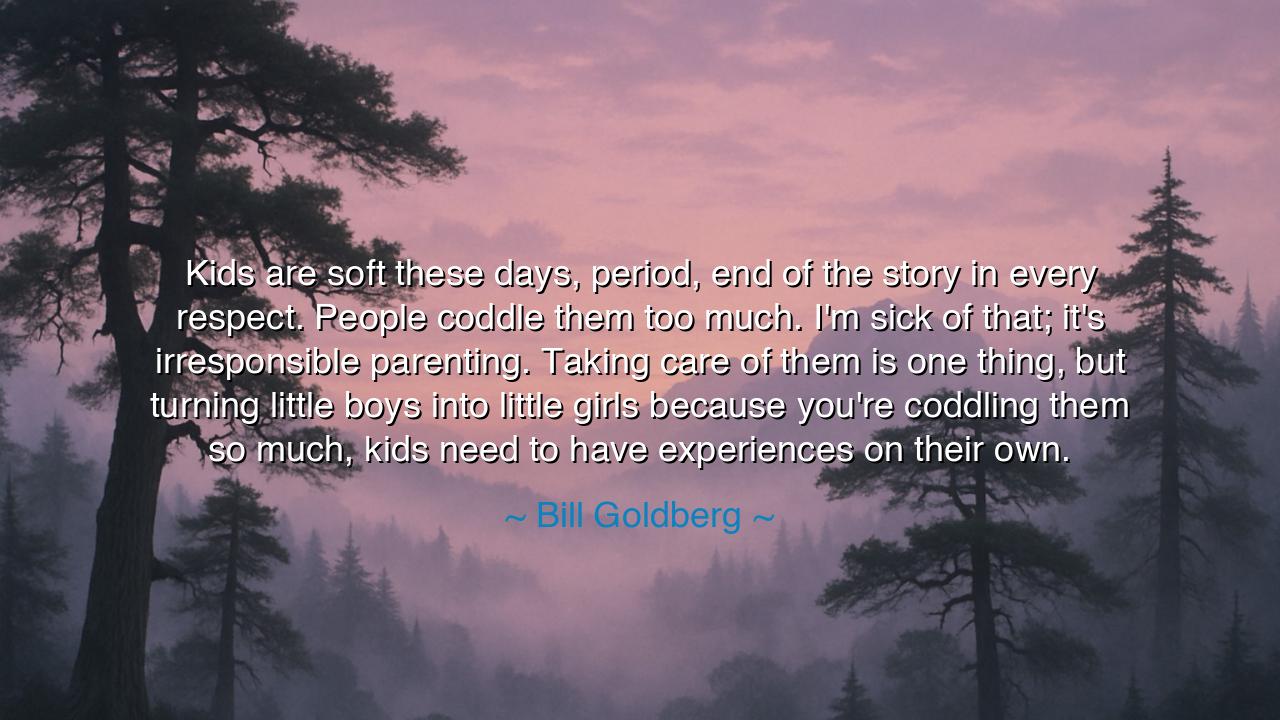
Kids are soft these days, period, end of the story in every
Kids are soft these days, period, end of the story in every respect. People coddle them too much. I'm sick of that; it's irresponsible parenting. Taking care of them is one thing, but turning little boys into little girls because you're coddling them so much, kids need to have experiences on their own.






The words of Bill Goldberg—“Kids are soft these days, period, end of the story in every respect. People coddle them too much. I’m sick of that; it’s irresponsible parenting. Taking care of them is one thing, but turning little boys into little girls because you’re coddling them so much, kids need to have experiences on their own.”—strike with the force of a warrior’s voice, rough yet laced with urgency. They are not meant as gentle counsel, but as a fiery warning: that overprotection breeds weakness, that sheltering children from struggle robs them of the very fire they need to become strong, resilient, and noble adults.
In the ancients we find this same teaching. The Spartans, fierce and unyielding, raised their children not with pillows and comforts, but with trials. From youth they were tested in hunger, in endurance, in combat, not because their elders despised them, but because they believed that only through hardship could one discover strength. Goldberg’s lament is the modern echo of this: that coddling makes for fragile souls, while challenge builds the sinews of courage.
History offers us vivid proof in the story of Theodore Roosevelt. As a boy, he was frail, asthmatic, and weak. His father told him plainly: “You have the mind, but not the body; without the body, the mind cannot go as far as it should. You must make your body.” And so, young Roosevelt embraced hardship, building his frame through boxing, hunting, and vigorous life outdoors. He grew into a man of iron resolve, a president whose strength of character inspired a nation. Had he been coddled, his spirit might have withered; instead, his struggles carved him into greatness.
Goldberg also speaks with the passion of a father’s heart. Parenting, he warns, is not the mere act of protecting children from harm, but the art of preparing them to face life’s storms. To feed, to clothe, to care for them is necessary, but if one never allows them to fall, to fail, to fight for themselves, then one cripples rather than nurtures. His words remind us that true love does not shield from every danger, but equips the young to meet danger with courage and wisdom.
The emotional weight of this teaching lies in its paradox: parents shield out of love, yet over-shielding becomes irresponsible parenting. For to rob a child of experience, of failure, of independence, is to deny them the very tools of adulthood. It is as if one forged a sword but refused to let it touch the flame, leaving it soft, brittle, and unworthy of battle. Children, too, must be tempered by challenge, else they remain forever unready.
What, then, is the lesson? It is this: do not fear to let the young struggle. Do not rush to solve every problem for them, nor silence every hardship. Instead, let them meet difficulty with their own hands, while guiding them with wisdom from afar. For in that crucible of trial, they will discover both strength and humility. Shield them too much, and you raise fragile beings; let them wrestle with life, and you raise heroes.
Practically, this means allowing children to face small failures and consequences: let them work, let them try, let them fall, and let them rise again. Encourage independence, responsibility, and resilience. Teach them not that the world is soft, but that they are strong enough to endure its hardness. And in this way, they will grow not as coddled children, but as men and women of character.
Thus, Goldberg’s words, though harsh, conceal a timeless truth: hardship is not cruelty, but preparation. To raise strong children is to let them walk their own path, stumble on their own stones, and rise with their own strength. Let every parent remember: to coddle is to weaken, but to challenge with love is to build souls worthy of carrying the burdens of life. And in that building lies the nobility of the next generation.






AAdministratorAdministrator
Welcome, honored guests. Please leave a comment, we will respond soon